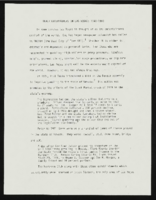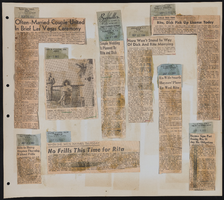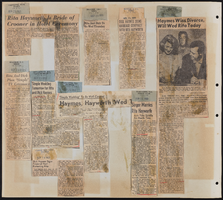Search the Special Collections and Archives Portal
Search Results

"Black Entertainers in Las Vegas in the Era of Segregation 1940-1960": manuscript draft by Roosevelt Fitzgerald
Date
Archival Collection
Description
From the Roosevelt Fitzgerald Professional Papers (MS-01082) -- Unpublished manuscripts file.
Text

Transcript of interview with Otto Merida by Claytee White, May 18, 2017
Date
Archival Collection
Description
When looking back on his legacy in the Latinx community of Las Vegas, Otto Merida (1945 - ) takes great pride in being a Latin Chamber of Commerce [LCC] co-founder with Arturo Cambeiro. With the LCC, they forged a powerful economic entity that continues to provide the local Latino community with social and political influence. Growing up during the 1950s in Havana, Otto Merida fondly remembers his childhood despite living under the dictatorship of Fulgencio Batista. There were the murmuring sounds of explosions from afar on the way to baseball games, but also the warm Sunday family meals of Cuban soup with fideos. In this interview, he talks about the rising communist powers inspired by revolutionary Fidel Castro and the events that led his family to place him in the Peter Pan Program in 1961. The Peter Pan Program sent unaccompanied Cuban children to the United States to avoid potential instruction by Castro’s government. Merida still holds on to his mother’s final request upon leaving Cuba-“I want you to remember the address where we live and the phone number: Josefina 68-entre primera y segunda-La Víbora, Havana con el teléfono X4304.” As a part of the Peter Pan Program, Merida experienced a nomadic childhood living in barracks in Miami and a three-story home in Wilmington, DE. The only connection he had to his family were a series of letters he exchanged with his mother, until they reunited years later in Miami. For Merida, life on 79th Street and Biscayne Boulevard in Miami was defined by the values of his family and other Cubans and African Americans in his neighborhood. v Merida earned his bachelor’s degree in Political Science from the University of Florida. He credits his sister-in-law with a pivotal role in his decision to pursue a higher education. His engagement in politics continued through his involvement with the Cuban Circle, the first Hispanic community to be involved with politics in Las Vegas. He describes the migration of Cubans to the casino scene of Las Vegas and the presence of Cubans in the community. His work with the Cuban Circle inspired him to develop a political presence for Hispanics in the community. While travelling across the United States before settling in Las Vegas, Merida made many significant relationships while working with associations such as the Fitchburg Chamber of Commerce and Volunteers in Service to America [VISTA]. Living in Las Vegas, Otto Merida worked as an educator and community organizer. In the late 1970s, Merida and Arturo Cambeiro collaborated to create the Latin Chamber of Commerce of Las Vegas. For Merida, the Chamber consistently goes above and beyond the vision he and Cambeiro had created when they first opened their doors. From the creation of the Latino Youth Leadership Program at UNLV to their work alongside political figures such as Senator Catherine Cortez-Masto, Merida is extremely proud of the various accomplishments of the Chamber. Now as President Emeritus, Otto Merida continues to dedicate himself to the Chamber as a volunteer and serves as one of the many Latinx Voices of Southern Nevada that have shaped the greater Las Vegas community.
Text

Gwen Weeks Rahner interview, March 06, 1981: transcript
Date
Description
On March 6, 1981, Laronda D. Tinsley interviewed Gwendolyn Weekes Rahner (born August 14th, 1923 in Atlantic City, New Jersey) at her home in Las Vegas, Nevada. In this interview, Mrs. Rahner discusses working in politics and registering people to vote in Las Vegas, Nevada. She also discusses living in West Las Vegas and her experiences there.
Text

Abraham Gomez interview, December 6, 2019: transcript
Date
Archival Collection
Description
Interviewed by Elsa Lopez. Abraham Gomez is a College Navigator for the Nevada Treasurer's Office where he is responsible for providing and distributing information on post-secondary resources that may enable Nevadans to go to college. Gomez was born and raised in Las Vegas, Nevada and grew up on the East Side near Desert Pines High School. He received an Associate of Arts from the College of Southern Nevada before obtaining a bachelor's degree in Communication Studies from the University of Nevada, Reno. After graduating he worked as a GEAR UP Ambassador for Nevada State College where he advised a cohort of 46 low-income students on the importance of continuing their education. He has volunteered with various organizations throughout Southern Nevada and continues to work to better his community and make education accessible to students everywhere.
Text

Transcript of interview with Owen Earl Cox by Mark Milford, March 6, 1981
Date
Archival Collection
Description
On March 6, 1981, Mark Milford interviewed Owen Earl Cox (born 1909 in Bunkerville, Nevada) about his experiences growing up in and working in Nevada. Cox first talks about his early moves to and from Nevada and his work in road construction in the 1930s. He then discusses his work of machinery at the Basic Magnesium Plant and some of his experiences during that time. Cox also talks about his family, the Mormon Church, the growth of population, and the increase in tourism. He later describes managing a store he owned known as Vegas Village and the types and prices of the products that were sold there. The end of the interview involves a discussion of crime, Cox’s hobby of cattle ranching, and his views on the growth of Las Vegas.
Text

Transcript of interview with Vincent Kethen by Claytee White, December 23, 2009
Date
Archival Collection
Description
In 1964, the year that Vincent Kethen was born, desegregation of Las Vegas schools began. Like many African-American children living in the Las Vegas Westside neighborhood, Vincent was bused out of his neighborhood in third grade to attend a white school. In his case, this meant attending John S. Park Elementary and later other predominantly white schools. He talks about these experiences. John S. Park was a neighborhood of manicured lawns, while the school bus and the classroom were places fraught with fisticuffs. The experience of growing up during that era are recalled. Vincent provides a sense of that it was like to reside in his home neighborhood and the onslaught of the drug culture altered gang-lead neighborhoods. Being bused had positive results he explains, such as athletics, which served as an equalizer. For Vincent, a solid upbringing, which included love of church and the chance to attend college, encouraged him to make good decisions about his future. He received a four-year degree and he returned to Las Vegas to "give back." For over a decade and a half, her has coached young basketball players and helped them see their options for a brighter future than they might otherwise have seen.
Text

Transcript of interview with Yvonne and Joni Fried by Barbara Tabach, February 17, 2016
Date
Archival Collection
Description
Yvonne Fried, M.D., and Joan “Joni” Fried are the daughters of Milton and Esther Fried, the founders of Freed’s Bakery—the standard to which all other Las Vegas bakeries are held. When the Fried family moved to Las Vegas in 1955, Joni was born here, the fifth child, of the entrepreneurial Milton, a musician by night, and his industrious wife Esther, who guided the family business. As Esther’s 2006 obituary reads: in 1959 the couple opened “a snack bar, selling donuts and Danish, at the Panorama Market on West Charleston, while Milt played in the show band at the Sahara Hotel in the evenings.” For Yvonne and Joni, this made for a rather busy and interesting household to grow up in. Their Jewish upbringing was at Temple Beth Sholom. Photo above honors the multi-generations of the Freed’s Bakery tradition: (L-R) Joni Fried, Anthony & Sarah Fusco (Joni’s daughter) Max Jacobson Fried (Yvonne’s son) holding his son Lucas, and (far right) is his wife Emilia.
Text



